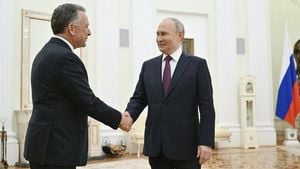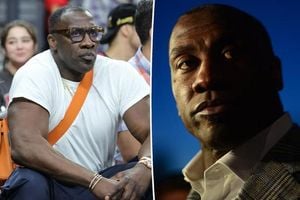Protests erupted across Mozambique following the announcement of disputed presidential election results earlier this month, leading to violence and significant unrest throughout the country. The ruling Front for the Liberation of Mozambique (Frelimo) party declared victory for its candidate, Daniel Chapo, amid widespread allegations of fraud and corruption. The opposition, spearheaded by independent candidate Venancio Mondlane, claims the election was rigged, and as anger spills onto the streets, it's becoming increasingly evident the situation is deterioriating.
Since the elections on October 9, the streets have been filled with anger and violence as protests amassed, and the military stepped up its presence to control dissent. Local groups have reported alarming numbers of casualties—over 30 fatalities attributed to security forces attempting to quash unrest, with rights organizations, including Human Rights Watch, stating at least ten children have been killed. During these protests, injuries were commonplace, with at least 67 people reported dead from mid-October to mid-November as activists fought for their voice to be heard.
Nations around the world, including the United States, Britain, Canada, Norway, and Switzerland, have voiced their condemnation of the violence against civilians and called for accountability. Their joint statement urged the Mozambique government to investigate the heavy-handed tactics deployed by security forces during the protests, underscoring the international community's concern for the welfare of innocent citizens caught up in the turmoil.
Eyewitness accounts from the capital, Maputo, paint a harrowing picture of the chaos. Videos shared online depict militarized vehicles charging through groups of protesters, one incident causing significant injury to a woman after being run over by one of the military trucks. The army has expressed regret, claiming it was an accident, promising to aid the injured.
Alongside the documenting of violence, two significant assassinations of opposition leaders have also heightened tensions. The killings of attorney Elvino Dias and filmmaker Paulo Guambe, which occurred near the height of the protests, have been called politically motivated murders by the opposing parties. Interestingly, as these tragic events unfolded, Mondlane himself was forced to leave Mozambique amid fears for his safety. He has continued to rally his supporters from abroad, urging them to maintain visibility and pressure.
While clashes between police and protesters have resulted in deaths and injuries on both sides, opposition leaders have called for organized protests to disrupt daily activities to voice their frustration at what they see as systemic corruption. Firearm violence has been rampant; demonstrators shield themselves behind barricades as they confront armed police trying to disperse crowds blocking major arteries and transport routes.
The protests have forced educational institutions and places of business to shut down, contributing to economic instability. Many Mozambicans, fearful for their safety, are choosing to remain indoors rather than risk becoming embroiled in the growing unrest. The army has been deployed across various cities as law enforcement struggles to maintain order.
Chapo's victory has reportedly extended Frelimo's 49-year tenure, making the results all the more contentious. Prominent international observers, including those from the European Union, have raised concerns about the legitimacy of the elections, noting irregularities throughout voting and counting processes. Frelimo's longstanding grip on power has drawn detractors who argue it has stifled political opposition and failed to provide adequate governance.
The political climate has reached fever pitch, with citizens taking to social media to organize protests and express their dissatisfaction with the government's actions. Young voters, increasingly disillusioned by the status quo, have taken to heart the calls for change and are becoming the backbone of the opposition movement. They rally under the slogan "We want change!" urging for transparency and justice.
Public outrage has only intensified since the election results, with demonstrations spreading to more cities after each installment of violence. Schools and businesses have remained shuttered as citizen fears continue to grow. Increasing clashes between police and civilians are drawing heavy criticism from international rights groups and foreign governments alike.
Significant public interest surrounds the alleged human rights abuses committed during this tumultuous period. The local monitoring group Plataforma Decide is among those highlighting the death toll and injuries sustained by protestors at the hands of security forces, which they allege failed to uphold their responsibility to protect the city's citizens.
Reports from Human Rights Watch reveal the harrowing consequences of police crackdowns, stating some minors detained have experienced unjust treatment. The advocacy group's director called attention to the violation of international law seen through these detentions, emphasizing the need for accountability and reform within the police force.
Despite government condemnation of protests, some Mozambicans remain steadfast, insisting they will persist until their demands for justice and democratic integrity are met. The scene is reminiscent of past uprisings across the globe where people's power challenged autocratic rule; such sentiments are being echoed by the protesters.
Activist groups are now more determined than ever to push back against what they perceive as undue political oppression, criminalizing dissent. Calls for nationwide awareness campaigns are surfacing, aiming to educate citizens on their rights and galvanize them against the prevailing powers. Time and again, Mozambicans have demonstrated their resilience, and it seems this time will be no different, as they look to carved out pathways to peace and stability.
With international pressure mounting and citizen-led protests intensifying, the world watches closely. The demand for human rights, dignity, and political Reform is at the forefront, and the outcome remains to be seen as resistance grows. Mozambicans are yearning for change, and they’re taking steps to make sure their voices don't go unnoticed.
Despite the uncertainty, there’s determination beneath the anger. People appear willing to risk it all for the hope of seeing accountability and justice restored. Whether or not their cries will be heeded by those currently holding power remains to be seen, but what is clear is the growing discontent is not simply fleeting.



